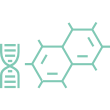How to get started?
If you have an advanced, incurable, or an earlier diagnosis of a poor prognosis cancer, ask your oncologist about accessing free CGP through Omico today.

More effective treatment

Fewer side effects

Potentially extend life

Maintain quality of life
Precision oncology is a ground-breaking and rapidly evolving approach to cancer treatment. It helps doctors choose the most effective treatment by studying the unique features of a person’s tumour. Cancer starts when certain changes happen in the DNA of a cell. DNA is like the instruction manual for a cell. Some DNA changes cause cancer to grow uncontrollably. Precision oncology identifies these changes and finds precise treatments that target the changes aiming to slow or stop the cancer from growing. In this way, treatment is precisely matched to the features of the person’s cancer. This personalised approach can mean better treatment results and fewer side effects, making the treatment journey smoother for patients.
Watch Mandy Ballinger, one of our experts, explain how precision medicine can improve outcomes.
The newest precision oncology treatments are almost always tested in clinical trials before they become widely available.
Clinical trials can be a positive step to accessing potentially ground-breaking treatments tailored precisely to your cancer’s fingerprint. Everyone enrolled on a clinical trial gets the treatment being tested or the current standard of care treatment that they would normally get outside the clinical trial. There is no placebo or non-treatment option used in cancer clinical trials.
Being on a clinical trial also means that your health and wellbeing is closely monitored by a medical team throughout the trial. Your safety and wellbeing are a priority to the researchers who run clinical trials.
To participate in our Cancer Screening Program (CaSP), you must be aged 16 years and older, and have advanced or incurable cancer, or an earlier diagnosis of a cancer that has a poor prognosis, i.e., the cancer has a low chance of being cured or controlled by treatment. Precision oncology is based on genetic changes within your tumour tissue. So, when you have completed comprehensive genomic profiling with CaSP and we know the specific features of your tumour, we can determine if there are potential targeted treatments or clinical trials that you can be matched to.
We encourage you to talk to your cancer doctor (oncologist) to understand if accessing CaSP is appropriate for you.
Even if a cure for your cancer isn’t currently possible, CGP and treatment matching can offer valuable opportunities to optimise your treatment plan, reduce treatment side effects, manage symptoms, potentially extend your life, and maintain your quality of life. It’s about finding the best possible approach to support you through your treatment journey.
When considering treatment options for advanced, incurable, or poor prognosis cancers, it is helpful to have as much information as possible about your cancer to guide treatment decisions effectively and increase the chances of finding a precision treatment that matches your cancer.
To date, approximately 75% of patients who have undergone CGP in our Cancer Screening Program (CaSP) have received a recommendation to be potentially matched to a treatment. Not everyone referred to CaSP for comprehensive genomic profiling will get a “fingerprint” result that has a matching precision treatment. Sometimes, even if a precision treatment is identified there may be no clinical trial in Australia or the potential treatment may not be available. You and your doctor can discuss which treatment options might be best for you.
If a clinical trial with a matching precision treatment starts in Australia after your oncologist gets your results and report, Omico will contact your referring doctor with the information, allowing them to discuss the option with you.
Your participation in CaSP not only provides you and your oncologist with more information about your cancer, which may help to match you to a precision treatment, it also advances the understanding of cancer and treatment, potentially benefiting others facing similar challenges in the future.
Omico is a national, not-for-profit organisation changing the way we fight cancer by accelerating access to precision oncology. Our work is made possible through funding and support from the Australian Government, state government and many organisations and professionals that specialise in cancer care.
Learn more about our partners